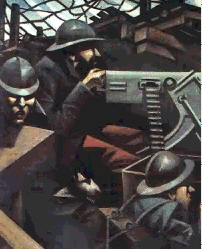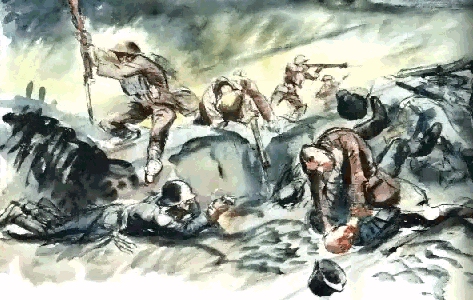

First World War: Nationalism, Militarism,
and Imperialism
(How did mistaken views of human evolution and
progress help cause the First World War in the following themes: Nationalism, Militarism,
and Imperialism?)
QCC objectives for the 5th and 9th grades |
Ideas |
(5.12) Recognizes the causes of World War I --nationalism (honoring and promoting one's own nation above all others) --militarism (glorifying war and preparing armed forces for conflict), and --imperialism (creating an empire by dominating other nations). (7) |
Comparing Japan's Strengthening the Nation through Expansion (Fukoku Kyouhei), America's Manifest Destiny, and Germany's World Policy (Weltpolitik) should be compared. What we now condemn as crimes against humanity were accepted policy a century ago. That background should help the students understand the rise of Militarism in the industrial nations and the start of the First World War, and continued revolutions and wars after it. |
| Upper secondary grades (9-12.17) identify and analyze the development of European nationalism with emphasis on Italy, Germany, and the Balkans. They also study the life of Bismarck. | Episode One, "Explosion," Part One of The Great War video series is a good overview, but it needs a preface of the international rivalry in the New Imperialism of the period. Bismarck and Wilhelm are compared in the video. |
| After tracing such causes of the First World War, students consider the effects of the war, evidenced by the reaction of common Russians, led by Lenin, in the Bolshevik Revolution (9-12.20). | How was this a new form of nationalism, and why were the common people so dissatisfied with the previous form of Russian nationalism? Use the section of The Great War on "Mutiny" (episode 5), provides very good background on the Bolshevik Revolution's roots in the First World War. How did this form of nationalism -- communism -- appeal as a world movement? |
| Upper secondary school students also have to explain American entry into the war
and describe the impact of the war on life in the United States: the sinking of the Lusitania; U-Boat/Zimmerman note; women and blacks enter the arms industries; suppression of pacifists and dissenters; 18th (prohibition) and 19th (women's suffrage) amendments ratified; rejection of Wilson's League of Nations; isolationism vs. interventionist (9-12.29). |
For
a good description of suppression of American dissenters, the chapter, "The War for
the American Mind" in Over Here: The First World War and American Society, by
David M. Kennedy is a good one. There is a good introduction to this chapter in part two
of the paper, Twentieth Century Currents: "Race" and "Nation" accross
the World Wars" here (www.worldclass.net/toolbox/ worldwar/scscl/nation.htm#amer ). |


Advanced Research
Links to Primary Sources
(link outline format from the Internet Modern History Sourcebook, http://www.fordham.edu/halsall/mod/modsbook35.html , will open in a separate window here)
Nationalism was the most successful political force of the 19th century. It emerged from two main sources: the Romantic exaltation of "feeling" and "identity" [see Herder above all on this] and the Liberal requirement that a legitimate state be based on a "people" rather than, for example, a dynasty, God, or imperial domination. Both Romantic "identity nationalism" and Liberal "civic nationalism" were essentially middle class movements. There were two main ways of exemplification: the French method of "inclusion" - essentially that anyone who accepted loyalty to the civil French state was a "citizen". In practice this meant the enforcement of a considerable degree of uniformity, for instance the destruction of regional languages. The US can be seen to have, eventually, adopted this ideal of civic inclusive nationalism. The German method, required by political circumstances, was todefine the "nation" in ethnic terms. Ethnicity in practice came down to speaking German and (perhaps) having a German name. For the largely German-speaking Slavic middle classes of Prague, Agram etc. who took up the nationalist ideal, the ethnic aspect became even more important than it had been for the Germans. It is debateable whether, in practice, all nationalisms ended up as Chauvinistic and aggressive, but the very nature of nationalism requires that boundaries be drawn. Unless these boundaries are purely civic, successful nationalism, in many cases produced a situation in which substantial groups of outsiders were left within "nation-states".
Cultural Nationalism: The Nation as Positive Focus of Identity
Liberal Nationalism: The Nation as a Basis for Liberal Democracy
Triumphal Nationalism: The Nation as a Claim to Superiority
![]()
Government Responses and Labor
/ Between the World Wars: New Inventions and Depression /
Guide Index